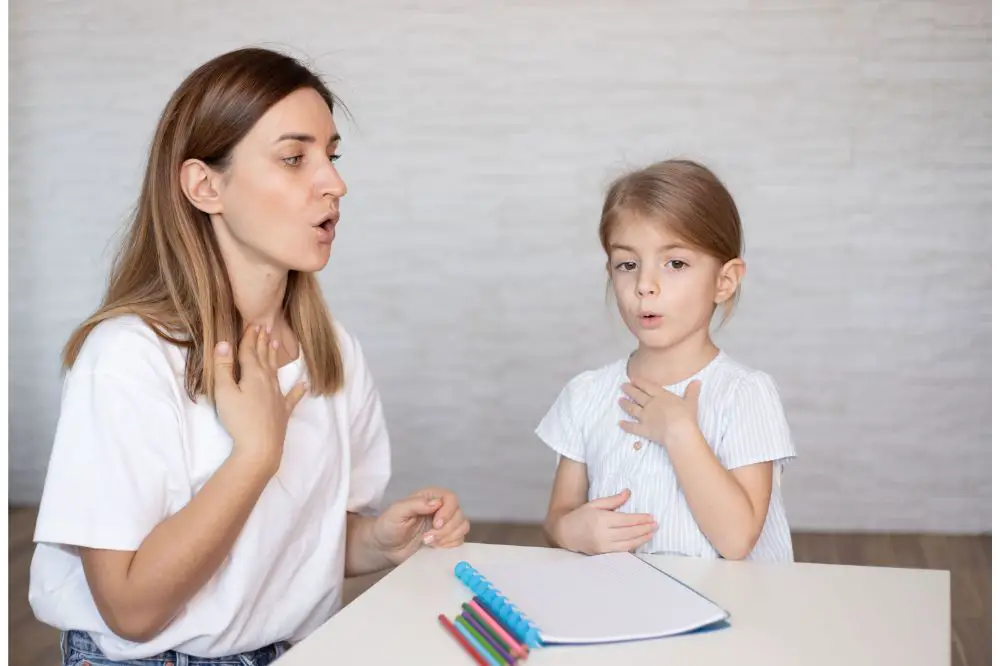Every infant and child is different from one another.
However, distinct, expected cognitive and motor skills development milestones exist. These milestones are the basis of a child’s developmental normalcy.
Unfortunately, millions of children worldwide show delays in developing cognitive and motor skills. One of which is speech delay.
You may wonder and ask, Is speech delay a disability that can alter my child’s life? Is one of your loved ones showing early signs of this? What steps should I take if I know someone with a delay?
Allow us to provide you with the right answers.
What Is Speech Delay?
Speech delay is a condition wherein the child may use words, but the listener will have difficulty understanding what he or she says.
Some sufferers also experience challenges in forming words; thus, they struggle to speak.
These symptoms are usually present in the early stages of an infant’s growth, so parents must be patient and keen on small details.
That said, here are common symptoms that manifest if an infant or child has a speech delay:
- Absence of babbling at 15 months
- Lack of talking at two years old
- Difficulty in speaking short sentences or phrases at three years old
- Troubles in following directions
- Difficulty in pronunciation and articulation
- Hard making words to make sentences
- Omitting words out of phrases or sentences
Types of Speech Delay
There are three types of speech delays that present in children:
- Receptive: This communicational delay is a deficit when a child experiences difficulties understanding language and communication.
- Expressive: This communicational delay is a deficit occurring when a child experiences difficulty verbally conveying words and meanings.
- Combination of Receptive and Expressive: A child may have receptive and expressive delays that may affect their way of life if left untreated.
Risks for Having Speech Delays
Many children are at risk of having delays, but here are the situations where they have more possibilities of having the condition:
- Males have a bigger chance of having delays than women.
- Premature infants
- Low birth weight
- A family history of speech and language issues
- Parents’ lower levels of education
Other Possible Causes of Speech Delays
Some kids with a speech delay usually have an underlying physical or developmental problem. Meanwhile, others are exposed to an environment that can lead to it.
Hence, here are some of the other causes of speech delay that you need to make a note of:
- Autism Spectrum Disorder
The onset of Autism Spectrum Disorder happens to a child before age three, and it is more common in males than females.
Delayed language development, inability to relate to others, repetitive motor activities, inability to make eye contact, and usage of touch to respond are common characteristics of autism.
Speech abnormalities present are usually echolalia and song-like quality methods of sound or word making.
- Cerebral Palsy
Speech delays are common if a child has cerebral palsy. Dyskinetic cerebral palsy patients have difficulties controlling their muscles, resulting in delays.
- (S)Elective Mutism
Children with (s)elective mutism do not speak because they choose not to.
A child with selective mutism usually speaks when they are alone, with relatives, or with friends. They would not talk in large crowds or in situations they deem uncomfortable.
Its basis is usually family psychopathology. Elective mutes typically have poor social skills and are overdependent on guardians. This condition is more common in females than males.
- Expressive Language Disorder (Developmental Expressive Aphasia)
Children with expressive language disorder have the usual intelligence, hearing and articulation skills, and emotional relationships with others.
The deficiency in expressive language disorder is a dysfunction that causes problems translating thoughts into speech.
Children with this condition tend to use gestures to be understood. They are also at risk of having dyslexia.
- Hearing Loss or Impairment
The most crucial factor in speech and language development is hearing.
Hearing loss at an early stage of a child’s development may hinder their communicational skills and lead to other disorders. There are two kinds of hearing loss, conductive and sensorineural.
Conductive hearing loss is irregular and can average from 15 to 20 dB. Sensorineural hearing loss may result from different causes such as:
- Intrauterine infection
- Kernicterus
- Drug use
- Bacteria
- Hypoxia
- Intracranial hemorrhage
- Specific syndromes
- Maturation Delay (Developmental Language Delay)
Maturation delay happens in the maturation of the central neurologic process needed to make a speech. It is more common in boys and those with a family history of late talkers.
This condition is usually outgrown, and sufferers achieve normalcy upon entering school.

- Mental Retardation
Children with mental retardation have delayed auditory comprehension and delayed use of gestures. Severe retardation means a slower acquisition of communicational skills.
That said, mental retardation accounts for almost 50% of speech delay cases. Although 40% of cases have an undeterminable cause, some known causes are:
- Genetic defects
- Hypothyroidism
- Hypoxia
- Intrauterine infection
- Kernicterus
- Maternal medication
- Meningitis or encephalitis
- Metabolic disorders
- Placental insufficiency
- Poisoning
- Trauma to the central nervous system
- Receptive Aphasia
Comprehension of spoken language is the number one issue in receptive aphasia.
Sans thorough observation, children with this condition seem not to listen or care, but they just have difficulty comprehending.
Contrastingly, children with receptive aphasia respond well to nonverbal auditory stimuli. Their method of speaking may be agrammatic and indistinct.
A child with receptive aphasia may develop a language understood only by those who interact with them regularly.
- Psychosocial Deprivation
Poor environment, poverty, and malnutrition, among others, are physical deprivation that a child with speech delay may have experienced.
Additionally, inadequate linguistic stimulation, absentee parents, deep emotional stress, and pure child neglect are social deprivation that aggravates delays in a child’s development.
These factors, together with abuse and neglect, are highly likely to develop such delays.
- Bilingualism
Bilingualism usually presents issues in the early stages of development. A child who lives in a bilingual household may experience problems comprehending the nuances of learning multiple languages.
When a child goes to school or interacts with more people, this issue resolves itself. The right educational toys can help parents and children in a bilingual home.
Diagnosis
If a minute speech delay symptom exists, it’s suggested to contact a licensed physician for diagnosis.
Medical professionals diagnose speech delay in several different ways. One is through body measurements such as height, weight, and head circumference.
Children suspected of having speech delays also get subjected to audiometry regardless of their capabilities.
Pure-tone audiometry, special earphones, and tympanometer are diagnostic tools used to detect components resulting in speech and language issues.
In the case of speech delays involving family history, a DNA test may be needed. On the other hand, an electroencephalogram is suitable for children with seizures and significant repetitive language disorders.
What Is a Disability?
Now that we clearly understand speech delays, let’s have an overview of what a disability is. This way, we’ll be able to answer, Is speech delay a disability?
Data show that 15% of the global population experience various physical and mental disabilities. That said, disability has three dimensions, namely:
1. Activity Limitation
These are difficulties in seeing, hearing, mobility, and problem-solving.
2. Body and Function
These are impairments in the body structure and function of a person. It includes limb loss, vision loss, hearing loss, and memory loss.
3. Participation
Participation limits the normalcy of daily social, vocational, and recreational activities. It also involves difficulty in acquiring healthcare services.
So, Is Speech Delay a Disability?
The answer to this question is yes, but it does not mean that a person with speech delays will suffer the rest of their lives. Treatments done by specialists will alter some effects of this disorder.
Support from groups, parents, families, and friends is also significant for children or people with speech delays. There are even books to help parents and guardians better understand speech delays.
It is advisable to get it diagnosed and treated immediately to mitigate future complications.

